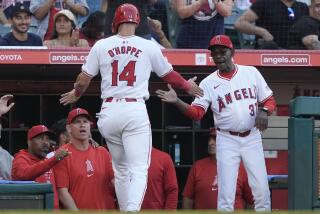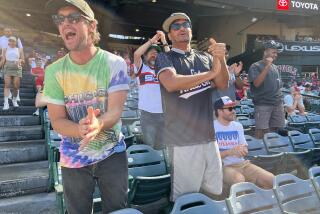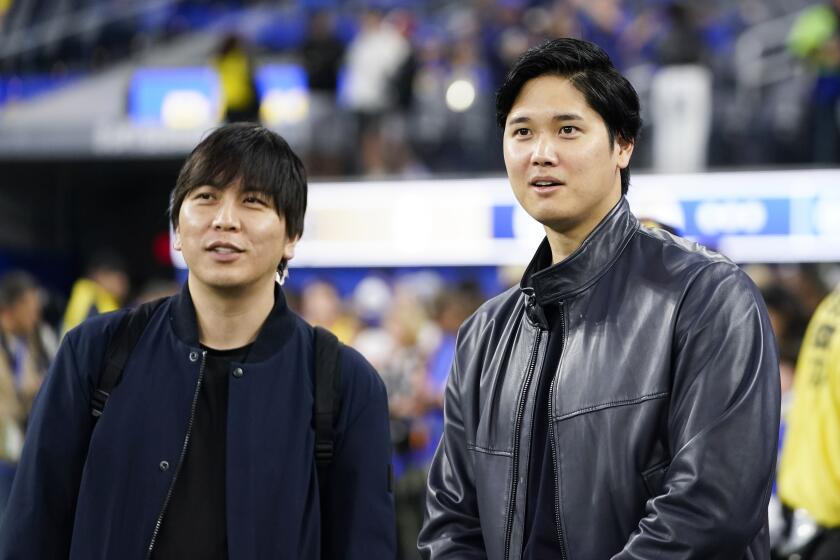Wistful ‘Angels’ Thank Heavens for Their Chance
Baseball’s replacement players found out Friday that they are like nuclear bombs.
Everyone has them, but no one wants to use them.
The vacuum-cleaner salesmen, Home Depot clerks and insurance agents who stepped in for striking major leaguers said they knew this all along. They said the apparent settlement of baseball’s labor dispute came as no surprise.
Still, moments before the 28th Freeway Series between the California Angels and the Los Angeles Dodgers, those hopeful understudies donning Angel and Dodger uniforms for their first real game--and possibly their last--could not hide their disappointment.
“It’s a microcosm of real life,” said Jim Campbell, 28, a left-handed pitcher who recently washed out of the Kansas City Royals organization. “You know it could be over any day.” But for the faux Angels, it could be over before it began. If the owners don’t vote this weekend to lock out returning players, replacement baseball could be the smallest of asterisks in the history of the game.
After playing in their first-ever Freeway Series, replacements will hit the highway.
“I cried a little bit earlier today,” said Carlos Castillo, a 23-year-old strikeout artist.
“Hey, it hurts your pride,” said Dean Locklear, 25, of Granite, Okla., who said this brief Angels stint was more exciting than being a minor league teammate of basketball- cum -baseball star Michael Jordan.
In the minor leagues, Locklear said, he never saw the kind of luxury he has known these last six weeks.
“Shoes shined. Bags carried. Two tops and two pants.”
He rolled his eyes.
Plus, he added, a brand-new box of “pearls” (new baseballs) every day during batting practice.
Then, in the wink of an eye: From sub to scrub.
To make matters worse, Angels officials told replacements to wear their blue replacement jerseys for Friday night’s contest with the Dodgers, not those crisp white home jerseys hanging in their lockers, the ones with their names emblazoned across the backs.
“Oh, well,” Locklear sighed, suiting up. “A blue jersey is better than no jersey.”
“Any day that you’re in the uniform,” said Dion Beck, 31, an auto detailer from Laguna Niguel, “is a great day.”
Carlos Castillo’s sentiments exactly.
“It’s particularly disappointing you don’t get a chance to spend more time in this cathedral out here,” said Castillo, a sports psychology student from San Jose State University. “Yesterday, during our first workouts, there were moments I couldn’t get the smile off my face. These are moments you work toward your whole life, and then they pull the rug out from under you.”
Castillo said he is determined to be back.
In the meantime, disappointments give a man character.
“Nietzsche said, ‘To live life to its greatest fruitfulness, you must live it dangerously.’ ” Replacement baseball, he said, was his Nietzschean spring of living dangerously.
“This was a risk,” he said. “And you’ve got to take risks.”
As Castillo spoke, the music in the locker room grew louder, the players became rowdier, and everyone seemed intent on pretending their imminent release didn’t matter.
Frank DiMichele, 29, a life insurance agent, asked Angels coach Rod Carew for his autograph. When Carew agreed, DiMichele handed him a bag filled to the brim with hundreds of baseballs.
“I need to make some money now,” he told Carew, who was doubled over with laughter. “I figure I can sell these things.”
Then, to roars of laughter, Castillo did his impression of Jack Nicholson as Jimmy Hoffa:
“I’m gonna do what I gotta do to get the union back,” he bellowed in a tough guy’s voice that beautifully mimicked Hoffa, but also mocked both sides of baseball’s labor dispute.
While pitcher Jim Campbell ate a bowl of soup (his clubhouse nickname is “Soup,” someone felt compelled to explain) pitcher Tony Mack stared at the wall and did some deep breathing, trying to psyche himself for the game. A former vacuum-cleaner salesman, the 33-year-old Mack has had a fine spring, which earned him the right to start Friday night.
“It’s kind of a Catch-22,” he said. “Much as I’d like for it to be the real deal, you’ve got to take what is.”
The mood was more upbeat in the Dodger clubhouse.
“I’m just like everybody else; I want to see (major leaguers) come back,” said Ervan Wingate, 21, the youngest member of the replacement Dodgers. “I’m a baseball fan.”
“If not today,” said his buddy and teammate, Frank Smith, “there’s always tomorrow.”
The only time Wingate and Smith worried about tomorrow was when they arrived at Anaheim Stadium for Friday night’s game. Sauntering in with the air of veterans, they were distressed to be stopped by security guards, who didn’t believe they were pros and refused to admit them to the park.
Such are the indignities of replacement life.
Leo Ramirez, for instance, was thrilled to see his name and picture in the Angels game program. Then he looked closely and noticed that he was identified as J.D. Ramirez.
The paralegal-turned-pitcher took the slight in stride.
In a quieter moment, Ramirez confided that he does not want to return to his life as a paralegal.
“I’d rather be throwing balls around than throwing files around.”
But that was defeatist talk, which Castillo was not allowing. While lacing up his cleats, Castillo kept the impressions coming. Now Al Pacino, now Howard Cosell.
“The difference between the possible and the impossible,” he said, trying to keep his teammates light, “lies in determination.”
Nietzsche again?
“Lasorda.”
Angels manager Marcel Lachemann strode into the clubhouse. Lachemann has earned the players’ unconditional love, because of his professionalism, and they have earned his respect, because of their love for the game.
“They’re good kids,” he said. “Good men, really.”
The clubhouse doors were closed, but Lachemann later described the scene inside like this:
Several players noticed that the manager was wearing a blue Angels warm-up jacket buttoned to the collar. They asked if he was feeling chilled. With a wry smile, he pulled open the coat to reveal that he was wearing his home white jersey--a sign the players would be allowed to wear theirs too.
After hurriedly changing and preparing to run onto the field, several replacement players appeared moved to tears.
More to Read
Go beyond the scoreboard
Get the latest on L.A.'s teams in the daily Sports Report newsletter.
You may occasionally receive promotional content from the Los Angeles Times.






